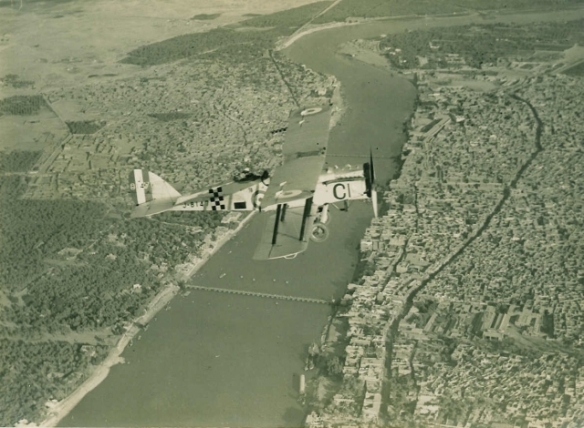
RAF Hinaidi, the main aerodrome in Baghdad. The new Iraqi government needed British military force necessarily to coerce the tribes into obedience. Aid troops recruited among Assyrian Christians that had fled from Eastern Anatolia into Iraq, and the British Royal Air Force took on this task. Tribes were bombed into paying taxes, whereas London was reluctant to give in to demands of the Iraqi government to form an Iraqi conscript army.
There was as little dynastic tradition in Iraq as there was a cohesive national territory and identity. London put Prince Faisal (1885–1933) on the throne, who was the son of Sherif Husayn ibn qAli (1854–1931) of Mecca and military leader of the Arab revolt of World War I. After his troops had captured Damascus in 1918, Faisal had ruled Syria. When the French removed him in 1920, it was a matter of disappointment for all Arab nationalists that British arrangements with Paris from the Sykes-Picot agreement weighed heavier than their commitment to support Faisal as an Arab leader. The throne of Iraq was meant to make up for this. Moreover, London believed that Faisal’s family origin as a descendant of the Prophet would give him authority among the diverse groups of the country. Faisal, however, was aware that he was entirely dependent on British support, and while the urban notability acquiesced to the new state structures soon, the tribal realm of Iraq did not comply. Other than the constitutional structures imposed on the state suggested, the new government needed British military force necessarily to coerce the tribes into obedience. Aid troops recruited among Assyrian Christians that had fled from Eastern Anatolia into Iraq, and the British Royal Air Force took on this task. Tribes were bombed into paying taxes, whereas London was reluctant to give in to demands of the Iraqi government to form an Iraqi conscript army. Conscription would have aroused even more opposition from the tribes.
London wanted to get rid of the mandate duties as quickly as possible in order to reduce the burden on the British treasury. In order to do this they had to fulfill contradictory tasks: convince the League of Nations that Iraq was fit to govern itself democratically, and at the same time bind the existing power elites—tribes, notables, Ottoman administrative elites—to a state that was dominated by a foreign king together with a military elite that had no stake in the traditional patronage networks of the country. These so-called Sherifian Officers of Iraqi origin had fought under Faisal’s command during the Arab revolt and formed his entourage in Syria. Later they joined him in Iraq and entered high government posts. In order to make Iraq presentable to the League of Nations, the British tried to strengthen the state by a mixture of coercive power and support of the state elite. Effectively, the old and new elites of the country joined interests as one landholding class. The Sherifian Officers dominated this process through the legislative processes in the new state, creating possibilities to acquire large portions of former Ottoman state domain land, for example. The organic law of 1924 gave the overwhelming power to the executive, and in a society that lacked a developed public sphere, elections to the parliament could be easily manipulated. An abstract institutional power of constitutional structures therefore never emerged.
The treaty of independence between Iraq and Great Britain was signed in 1930 and became effective with Iraq’s entry into the League of Nations in 1932. The treaty remained contentious, though, because it provided for a continued British military presence in the country. Two air bases were maintained, and Britain had the right to use Iraqi communication and transport lines in the case of war. Furthermore, Great Britain remained the exclusive supplier of military hardware and took responsibility for military training. On top of that, a large number of British advisers stayed in Iraqi ministries. The British ambassador remained highly influential, and Britain virtually controlled the Iraqi economy.